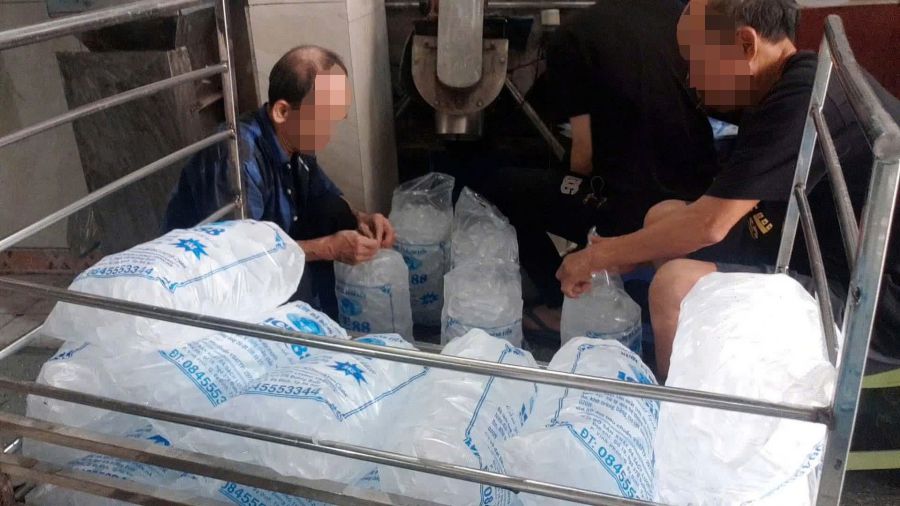Inside the "gourd" of clean stone production
For many years, the stonecut production department in lane 20 Buoi Street (Ba Dinh District, Hanoi) has been a source of stone for a series of coffee and food chains in the area. However, contrary to the image of cleanliness and purification promoted, according to records, inside the factory there is an unbelievable scene of unsanitary conditions.
Playing the role of a person who wants to open a stone factory in the province, the reporter was welcomed by Mr. Toan (character's name has been changed), claiming to be the owner of the facility, enthusiastically welcoming and sharing a lot of information about the production process.
"If you want to make stone, the most important thing is the water source. Here, it mainly uses groundwater, the same goes for the province. The tap water is there but not the main one, Mr. Toan affirmed.
To prove it, he took the reporter to the workshop's attic - where a filtering system and stone-making machine were installed with a capacity of about 4,000 bags per day. The attic is less than 30 square meters wide, with rusty machinery, and two underground water tanks turning white and yellow are operating to prepare for filming and making stone.
The most shocking scene was in the packaging stage: Three workers were ceilings, without protective gear, sitting directly on the floor to pick up and package the finished stone bags.
"Doing so is against regulations, we should have had protective gear, but we were in a hurry, getting used to it, so we just did it. Here, about 4,000 bags are produced every day, supplying many cafes and restaurants," the owner admitted.
The reporter questioned whether such a process meets food hygiene standards. Mr. Toan answered directly: "There is no shortage of documents, any criterion can be met. The important thing is to be able to produce, and the paperwork is the only way to take care of everything."

Mass supply, cheap
According to research, to be able to supply stones to customers, this stone factory operates continuously day and night, using 3 workers with a sketchy process as recorded, distributing to many famous coffee chains in Hanoi.
"We provide stone to many chains such as LK, AS... Every day they take hundreds to thousands of bags. The wholesale price is now about 7,000 VND/bag, if you take a lot, it can be reduced to 6,000," said Mr. Toan.
According to Mr. Toan, the cost of producing a bag is about 1,400 VND. Of which, electricity is 1,000, the rest is operating costs. If opened in the province and made strongly, with an initial capital of about 1 billion VND, the capital will be refunded in just 6 months to 1 year.
To produce refined ice cubes, used directly in food, establishments must comply with a series of strict regulations. First of all, water sources: Compulsory to meet drinking water standards according to QCVN 01:209/BYT or QCVN 01-1:2018/BYT. The finished stone must also meet QCVN 10:2011/BYT, and must not contain harmful bacteria such as E.coli, Coliform or Pseudomonas aeruginosa.
Stone-making equipment must be specialized, made of stainless steel, the production process must be closed, ensuring maximum limitation of dust and pollutants. Factories and processing areas must be airy, have a water supply and drainage system, lighting, insect destruction and be cleaned regularly.
The person directly producing the product must be trained and have a food safety certificate, while complying with strict personal hygiene requirements. The concrete must be packaged tightly, clearly stating the name of the manufacturing facility, address, date of manufacture and expiration date. Each shipment must be tested and published in accordance with regulations before being launched on the market.











